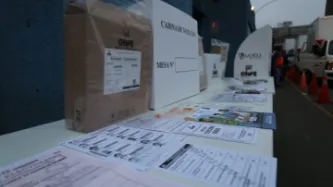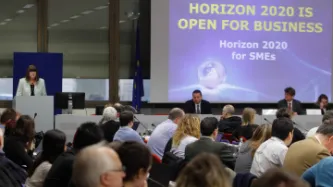Search
Content type: Landing Page
PI supports people everywhere to protect privacy, dignity, and freedom.
We target companies and governments that don’t respect your right to be free from their prying technologies. We expose their practices to public scrutiny. We pursue them in court. With you, we fight in the public interest, demanding better rules and stronger technologies globally. We help other organisations around the world. We help you learn how to protect yourself, your loved ones, and everyone else around the world…
Content type: Video
Find out why 53 organisations from all over the world are telling Google it's time they take action on pre-installed apps (bloatware).
You can listen and subscribe to the podcast where ever you normally find your podcasts:
Spotify
Apple podcasts
Google podcasts
Castbox
Overcast
Pocket Casts
Peertube
Youtube
Music by Glass Boy, find more of their work here: glassboy.bandcamp.com/album/enjoy
(creativecommons.org/licenses/by-nd/3.0/)
Content type: Long Read
This piece was written by PI Partner Hiperderecho's Executive Director Miguel Morachimo and originally appeared here. Image from here.
The recent congressional elections in Peru have been different in many ways. This is primarily because the rules that prohibit parties and candidates from advertising on radio and television through paid ads have been applied for the first time. That has led the effort and expenditure on electoral advertising to be focused on alternative platforms, from printed…
Content type: Landing Page
PI campaigns against companies and governments who exploit our data and technologies and threaten our freedom.
Below you can see the world we want for everyone: free from exploitation, free to use technology, free from unwarranted interference.
Whether you’re seeking asylum, fighting corruption, or searching for health advice, you and your rights should be protected, and you should be free to be human.
Content type: Report
The changes discussed in this article are based on a second analysis performed in late November, 3 months after the original study Your Mental Health is for Sale and following the exact same methodology. All data collected can be found at the bottom of this page.
Change is possible
Back in September 2019 we published the report Your Mental Health is for Sale exposing how a majority of the top websites related to mental health in France, Germany and the UK share data for advertising purposes.…
Content type: News & Analysis
On 30 January 2020, Kenya’s High Court handed down its judgment on the validity of the implementation of the National Integrated Identity Management System (NIIMS), known as the Huduma Namba. Privacy International submitted an expert witness testimony in the case. We await the final text of the judgment, but the summaries presented by the judges in Court outline the key findings of the Court. Whilst there is much there that is disappointing, the Court found that the implementation of NIIMS…
Content type: Case Study
Discriminatory laws on the basis of sexual orientation across the globe exist in stark opposition to the principle that the law should be the same for each and every one of us. We are all entitled to the same protections against any discrimination. Equality before the law dictates that there must be a reasonable justification to regulate any aspect of a person’s life.
Laws discriminating on the basis of sexual orientation interfere with our private lives and development. There can be no…
Content type: People
Artiom is in charge of the Monitoring, Evaluation and Learning component of PI’s work. He is responsible for development and implementation of PI's monitoring evaluation and learning strategy, contributes to improving of effectiveness of the programmes, helps to build organisation's and partners’ MEAL capacity, assess program’s performance and impact, contributes to preparation of donor reports and communication materials.
Artiom is an MSc in Sociology and previously worked as Impact…
Content type: Key Resources
From Google's acquisition of the Usenet archive in 2001 to walkouts in 2018 over Google's lack of respect for people's privacy in attempting to transform part of Toronto in to a so-called 'smart' city - Google has a long history of abusing people's privacy. This is a timeline of all of those abuses.
Content type: People
Ioannis joined PI in 2019 as a Legal Officer. For the past few years, he has been leading our work on data and competition, and also coordinates our litigation before domestic and international courts as well as data protection and anti-trust regulators.Ioannis holds a law degree from the University of Athens (Greece) and an LL.M. in Human Rights Law (University College London). He has researched and published extensively on the topics of human rights, surveillance and national security.
Content type: Examples
Recent study shows that Americans are wary of data from smart speakers being used in criminal investigations, the Pew Research Center reported. A recent study showed that 49% of Americans answered that it is unacceptable for smart speakers companies to share audio recordings of their customers with law enforcement in order to help with criminal investigations. Only 25% said it is acceptable. Aparently, this result contrasts with some other data use practices measured in the same survey. For…
Content type: Long Read
Photo by Scheier .hr on Unsplash
Where, when, and what you watch is becoming very interesting to political actors and the marketing companies they work with.
In the US for example, three-quarters of households have at least one smart TV. As you watch a show, the TVs watch you, and collect vast amounts of data about your activity, viewing preferences, when you watch, and more. The US Federal Trade Commission has gone after one smart TV company but stopped short of banning this type of data…
Content type: Advocacy
We welcome the effort by the Government of Kenya to give life to and specify the right to privacy, already enshrined in Article 31(c) and (d) of the Constitution of Kenya by proposing a draft Data Protection Act. We particularly appreciate the direct reference to this Constitutional right in the purpose of the Act and the way it is referred to on several occasions in the Act.
While these efforts have positive intentions and we are pleased that Kenya has adopted a comprehensive data protection…
Content type: Long Read
It was a quiet evening in Agadez, a bustling Saharan city in the centre of Niger. Thirty-five year old Agali Ahmed was sipping tea at a friend’s place, as he often did, when he received a message: police were at his uncle’s house. When he got there, Ahmed saw men in plainclothes, standing around the building’s gate. Inside, more men were searching the apartment. Three white men, who Ahmed guessed were Spanish, asked for his phone and started taking pictures of him. They told him to follow them…
Content type: Video
In this podcast Sara Nelson of PI’s Reproductive Rights and Privacy Project talks about the US based international anti-abortion organisation Heartbeat International and the technologies they are developing for their international network of affiliate organisations. We also discuss what reproductive rights are and why PI is working on the topic:
Music by Glass Boy, find more of their work here: glassboy.bandcamp.com/album/enjoy (creativecommons.org/licenses/by-nd/3.0/)
Content type: Long Read
We are excited to spotlight our Reproductive Rights and Privacy Project!
The Project is focused on researching and exposing organisations that collect and exploit the information of those seeking to exercise their reproductive rights. Working together with PI partners, other international grassroots organisations and NGOs, PI is researching and advocating against this data exploitation.
So, what are reproductive rights?
Sexual and reproductive rights, which are contained within Economic,…
Content type: Long Read
The European Union (EU) spends billions on research and development aimed at driving economic growth and jobs, as well as furthering the bloc’s broader agenda. Within the current budget, known as Horizon 2020 and covering the years 2014-2020, some €80 billion has been made available for research in a huge number of areas, ranging from finding cures for diseases to helping keep the earth viable for life.
From the same budget, it also funds a lot of projects aimed at developing surveillance…
Content type: Case Study
Every one of us has an expectation to be legally protected in the same way, to have access to the same human rights, and to be able to defend those rights in court.
However, for trans and non-binary people, this has not always been the case – and in many places around the world it still isn’t the case. The lack of legal recognition for their gender has had significant consequences.
If the law does not recognise you as the person that you are and treats you as someone you are not then you…
Content type: News & Analysis
Today Advocate General (AG) Campos Sánchez-Bordona of the Court of Justice of the European Union (CJEU), issued his opinions (C-623/17, C-511/18 and C-512/18 and C-520/18) on how he believes the Court should rule on vital questions relating to the conditions under which security and intelligence agencies in the UK, France and Belgium could have access to communications data retained by telecommunications providers.
The AG addressed two major questions:
(1) When states seek to impose…
Content type: Press release
Today the Advocate General (AG) of the Court of Justice of the European Union (CJEU), Campos Sánchez-Bordona, issued his opinion on how he believes the Court should rule on vital questions relating to the conditions under which security and intelligence agencies in the UK, France and Belgium could have access to communications data retained by telecommunications providers.
The AG advises the following:
The UK’s collection of bulk communications data violates EU law.
The French and Belgium…
Content type: Advocacy
In December 2019 Privacy International made submissions to Police Scotland in relation to documents designed to explain to the public how cyber kiosks will work and what information will be given to victims when Police Scotland extract data from their phone.
Police Scotland rely on 'consent' to seize a phone from a victim. We believe the lack of information provided to the individual regarding extraction, examination, retention, deletion, sharing and search parameters undermines that any…
Content type: News & Analysis
Maddie Stone, formally a Senior reverse engineer and tech lead on the Android security team, shockingly revealed a number of examples of how pre-installed apps on Android devices can undermine users privacy and security in her BlackHat USA talk in August 2019. The video of the talk only recently became available to the public in late December 2019.
The apps in question come preloaded on a device when it is purchased and often can't be removed. Stone reveals a litany of abuses carried out by…
Content type: News & Analysis
Privacy shouldn’t be a luxury.
Google claim to agree with us - we know that because Sundar Pichai, their CEO, said so this May in the New York Times. And yet, Google are enabling an ecosystem that exploits people who own low-cost phones.
Today we, along with over 50 organisations including Amnesty International, DuckDuckGo, and the ACLU are asking Google to step up, and we’re asking you to join us in pressuring them to do the right thing.
Sign the petition
Google has the power to…
Content type: Advocacy
Puede encontrar la carta a continuación. Agregue su voz a esta campaña firmando nuestra petición si cree que es hora de que Google deje de permitir la explotación.
Nota: Esta carta también está disponible en francés e inglés.
Estimado Sr. Pichai,
Nosotros, los firmantes, estamos de acuerdo con usted: la privacidad no puede ser un lujo reservado para las personas que tienen la capacidad de pagar por ella.
Sin embargo, los socios de Android Partner –que utilizan la marca y la imagen de…
Content type: Advocacy
You can find the letter below. Add your voice to this campaign by signing our petition if you believe that its time Google stopped enabling exploitation.
Note: This letter is also available in French and Spanish
Dear Mr. Pichai,
We, the undersigned, agree with you: privacy cannot be a luxury offered only to those people who can afford it.
And yet, Android Partners - who use the Android trademark and branding - are manufacturing devices that contain pre-installed apps that cannot be deleted…
Content type: Call to Action
You should know what new technologies police are deploying on your local community. We want to find out if UK police are using cloud extraction tech, what law exists to protect your rights and what safeguards are in place. We need your help. See our new report for more info on cloud extractionIf you are not based in the UK but have a FOIA regime in your country you can still use our template text below and check if there is a FOIA platform to use here to send it in your own…
Content type: Advocacy
Vous pouvez trouver la lettre ci-dessous. Ajoutez votre voix à cette campagne en signant notre pétition si vous pensez qu'il est temps que Google cesse d'activer l'exploitation.
Ce contenu est également disponible en anglais et en espagnol.
Cher M. Pichai,
Nous, les organisations signataires, sommes d’accord avec vous :
la vie privée n’est pas un luxe, offert seulement à ceux qui en ont les moyens.
Pourtant, les « Android Partners » – qui utilisent la marque déposée…
Content type: News & Analysis
Send a Freedom of Information Request to your local police for to see if they are using cloud extraction here.On 12 December 2018 a member of Lancashire Police Department UK told viewers of a Cellebrite webinar that they were using Cellebrite's Cloud Analyser to obtain cloud based 'evidence'. In response to a Freedom of Information request Hampshire Constabulary told Privacy International they were using Cellebrite Cloud Analyser. They are not alone. In Cellebrite's…
Content type: News & Analysis
Cloud extraction allows law enforcement agencies to take huge amounts of your data from the Cloud via a legal back door. If law enforcement seize your phone or take it from a victim of crime, they can extract tokens or passwords from the device which lets them get access to data from apps such as Uber, Instagram, Slack, Gmail, Alexa and WhatsApp.
In so doing, law enforcement agencies can avoid official channels through cloud companies such as Google, Apple…
Content type: Long Read
Mobile phones remain the most frequently used and most important digital source for law enforcement investigations. Yet it is not just what is physically stored on the phone that law enforcement are after, but what can be accessed from it, primarily data stored in the Cloud.
Cellebrite, a prominent vendor of surveillance technology used to extract data from mobile phones, notes in its Annual Trend Survey that in approximately half of all investigations, cloud data ‘appears’ and that…






















